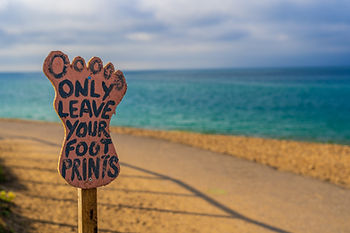Fighting Greenwashing needs Sustainable Professionals
- Fernando Jimfier
- 24 ene 2023
- 2 Min. de lectura
Sustainable brands can’t do communication as usual.

As every year, Davos gathered world leaders to discuss the main geopolitical topics in the World Business Forum. This year Climate Change was a major topic, of course. However, the big news went around something beyond the agreements and talks. It was about the leaders traveling to discuss climate change on their private jets creating thus significant carbon emissions.
A research launched by the Dutch environmental consultancy CE Delft found twice as many private jets flew to and from airports serving Davos during this event. The problem here is incoherence between the values proposed and the impact of living. To discuss and create positive impact, a change is needed. Same applies – and maybe strongly applies –for sustainable brands.
Unfortunately, communication around sustainability constantly falls in greenwashing, which at the end is a lie. Behind the words “responsible”, “eco-friendly”, “conscientious”, “ethical”, and many more, hardly are found real sustainable measures. On the contrary, campaigns like this sadly promote more consumption and disposal, among other non-sustainable practices.
Next to this, the consumers do not recognise real sustainable brands. In France alone, studies reveal that 70% of French users do not have in the top of their minds sustainable brands [1]. Also, 56% of French customers think that enterprises should communicate in a more efficient way their sustainable actions especially in the point of sale [2].
So, in short, there is a problem of communication surrounded of misleading actions and values. Sustainable brands should start acting differently. How? To create pertinent and efficient communication, change and impact, experts recommend:
1. Expertise and communication of scientific objectives.
2. Make it easy to discovery of sustainable brands. Need to promote and boost the communication of eco-brands, sustainable brands and local products
3. Effective and creative understanding and communication of sustainability.
4. To work with sustainable professionals who are both savvy in sustainability and media.
Let’s take a recent example. Some studies published by Johns Hopkins University show that when “fast food restaurants disclose the climate change impact of menu items, customers place orders less harmful to the environment”[3]. This is an example of an effective communication campaign creating branding but more important sustainable impact. This is communication that does not limit itself in creating a green image but an impact; a coherent one, an effective one.
So, if brands aim sustainability they need to change in every aspect. Business as usual is not the way anymore. If brands want to achieve real sustainability, they have to invest as well in effective communication strategies and the professionals who understands both, the business and even more important sustainability per se.
[1] CoMarketing News, 2022. “Les Français et les marques, une relation durable ?”. Available at: https://comarketing-news.fr/les-francais-et-les-marques-une-relation-durable/
[2] L’ADN, 2019. “Les chiffres clés de la RSE : les salariés en redemandent !
“. Available at https://www.ladn.eu/entreprises-innovantes/marques-engagees/chiffres-cles-rse-developpement-durable/
[3] Adler, Ben, 2023. Yahoo News. “Consumers order less beef when fast food restaurants disclose climate change impact, study finds”. Available at https://news.yahoo.com/consumers-order-less-beef-when-fast-food-restaurants-disclose-climate-change-impact-study-finds-194637120.html







Comentarios